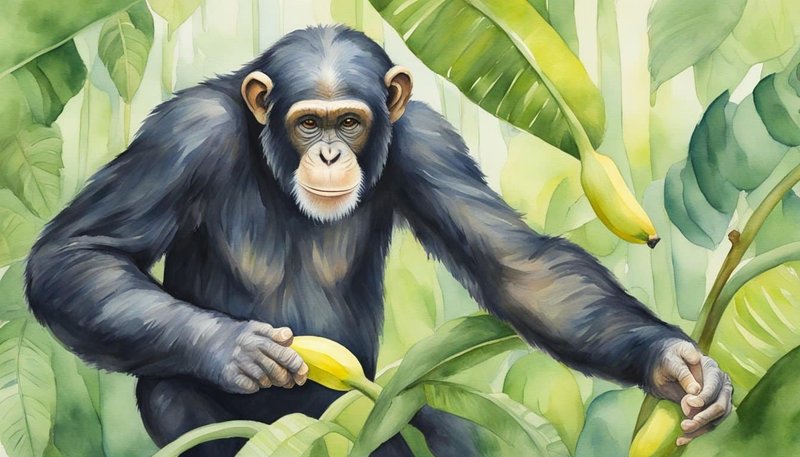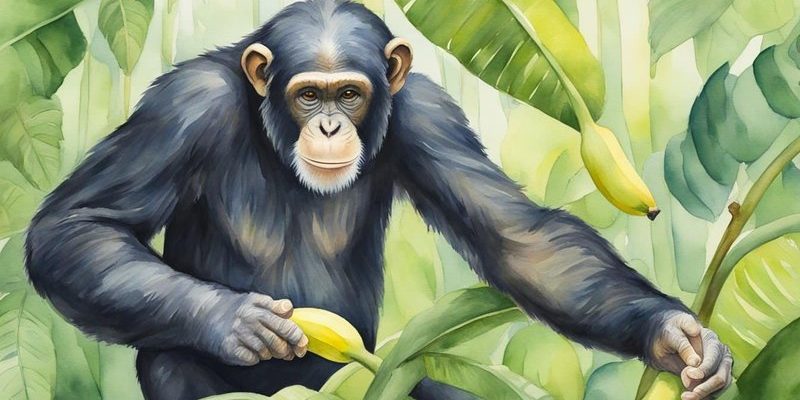
Let’s dive into the dietary habits and hunting techniques of these incredible primates. Understanding what they eat and how they procure food gives us insights into their behavior, social structures, and even their role in the ecosystem. So, grab that coffee, and let’s explore the lush world of chimpanzee dining and their impressive hunting strategies.
The Chimpanzee Diet: More Than Just Bananas
Chimpanzees are often associated with bananas, but their diet is way more varied. In the wild, they consume a mix of fruits, leaves, seeds, and insects. Their favorite fruits include figs, and they have a particular fondness for ripe fruits that are rich in sugars. This diversity is essential because it helps them get necessary nutrients.
You might be surprised to learn that chimpanzees are omnivores. They don’t just munch on plant material; they also enjoy hunting for insects and small animals. For instance, ants, termites, and even small monkeys can be part of their diet. When you think about it, it’s like having a buffet that changes with the seasons. When fruits are plentiful, they feast on them, but as those become scarce, they turn to other sources, ensuring they maintain a balanced diet.
Seasonal Changes in Diet
Chimpanzees are highly adaptable when it comes to their diet. The availability of food changes with the seasons, and they adjust accordingly. During fruiting seasons, you can find them gorging on the sweet bounty of the forest. In these times, they may spend their entire day foraging for fruits high in the trees.
But what happens when the fruits are gone? Chimpanzees will switch to different parts of plants, such as leaves, flowers, and bark. They are like nature’s foragers, always on the lookout for what’s in season. This flexibility in their diet shows just how resourceful they are, helping them thrive in various environments.
Hunting Strategies: Teamwork Makes the Dream Work
When it comes to hunting, chimpanzees are master strategists. You’ll often see them working together in groups to catch their prey. This type of hunting is not only about skill; it’s also about social bonding. They form tight-knit groups, often made up of family members or close social circles, to increase their chances of success.
Chimpanzees use a variety of strategies when they hunt. Sometimes, they’ll engage in what looks like a coordinated attack. For example, if they’re after a troop of monkeys, some may create distractions while others sneak up from different angles. It’s like watching a well-rehearsed play, where each actor knows their part and timing.
Tools and Techniques
You’re probably aware that chimpanzees are known for using tools, and this extends to their hunting strategies, too! They might use sticks to fish for termites or ants. In some cases, they even create makeshift snares to capture small animals. This behavior showcases their remarkable intelligence and adaptability.
Another interesting aspect is that hunting isn’t just about the chase. After a successful hunt, chimpanzees often share their food with others in their group. This sharing strengthens social bonds and reinforces their community structure. So, while hunting may appear competitive at first glance, it also plays a vital role in maintaining relationships within their group.
The Social Aspect of Hunting
The social dynamics of chimpanzee hunting are just as intriguing as their techniques. Hunting can influence social status among chimpanzees. Those who are more successful at bringing home food often earn respect and stature within the group. This hierarchy can lead to fascinating social interactions.
For example, a chimpanzee that frequently shares its food may gain favor with others, leading to stronger alliances. In contrast, a less successful hunter might find themselves isolated. This aspect of their behavior highlights how closely their survival is intertwined with social relationships. It’s not just about the meal; it’s about the community.
Learning from Each Other
Chimpanzees also learn hunting techniques from one another, particularly from older, more experienced individuals. Young chimps often watch their parents or elder group members to figure out effective methods. This kind of learning underscores the importance of culture in their societies.
You might think of it as a form of apprenticeship. Just like how we pass down recipes through generations, chimpanzees share knowledge about hunting strategies and tool use. This cultural transmission is crucial for their survival, as it helps them adapt to changes in their environment and maintain efficient hunting practices.
The Impact of Diet and Hunting on Ecosystems
The diet and hunting strategies of chimpanzees also play a significant role in their ecosystems. By foraging for fruits and seeds, they help with the dispersal of plants, contributing to forest health. As they eat fruits and excrete seeds in different locations, they facilitate the growth of new plants. It’s a perfect example of nature working in harmony.
Additionally, their hunting helps control prey populations. For instance, by preying on smaller monkeys and other animals, chimpanzees maintain a balance in the ecosystem. This balance is vital for the overall health of their habitats, ensuring that no single species overwhelms the environment.
Conservation Considerations
As we learn about the diet and hunting strategies of chimpanzees, it’s essential to acknowledge the challenges they face. Habitat loss, poaching, and climate change threaten their survival and, consequently, the balance of their ecosystems. Conservation efforts are crucial to protect these remarkable creatures and their habitats.
By supporting conservation initiatives, we can help ensure that future generations get to witness the incredible behaviors and strategies of chimpanzees. It’s a shared responsibility to protect not just the species but the intricate web of life they support.
Chimpanzees are more than just fascinating animals; they are skilled foragers and hunters with rich diets that reflect their adaptability and intelligence. Their hunting strategies, often characterized by teamwork and social bonding, highlight the complexity of their social structures. Understanding their behaviors helps us appreciate their role in the ecosystem and the need for conservation efforts.
When you think about chimpanzees, remember their remarkable diets and the strategies they use to thrive. They teach us valuable lessons about resourcefulness, community, and the delicate balance of nature. Next time you see a chimpanzee, think beyond the surface—there’s a whole world of behavior and strategy happening just below the surface.

